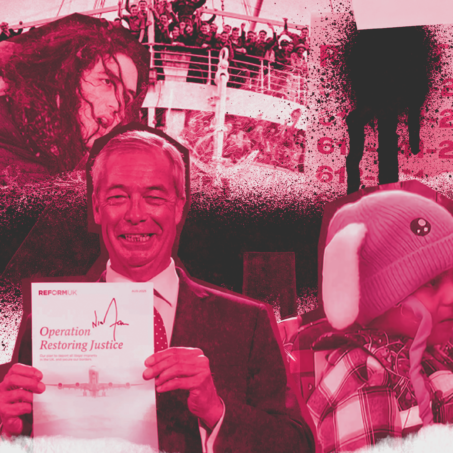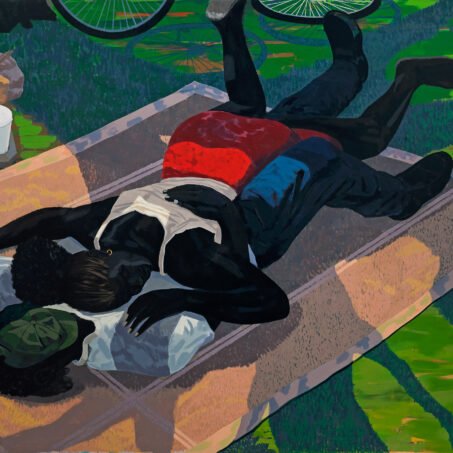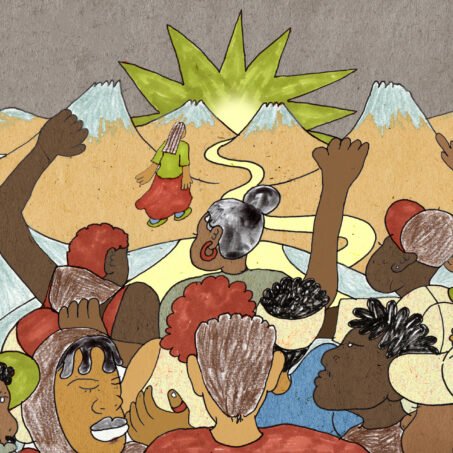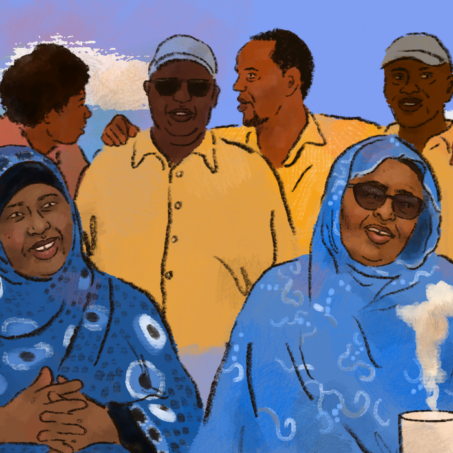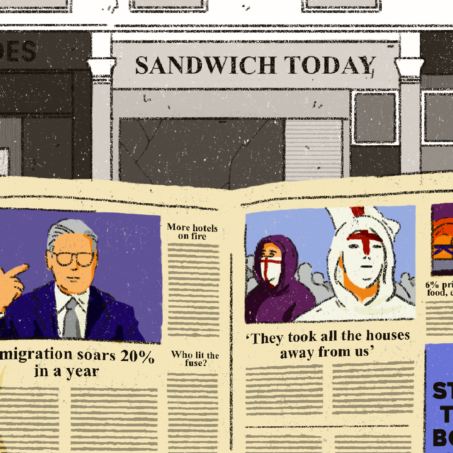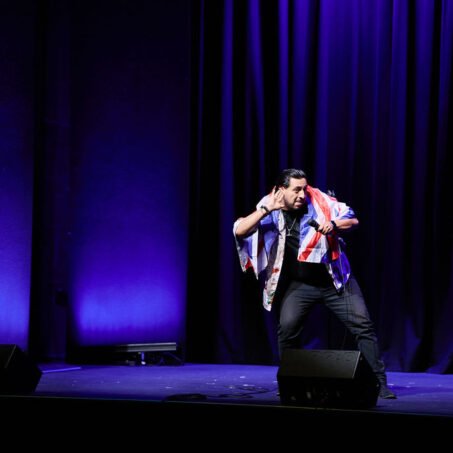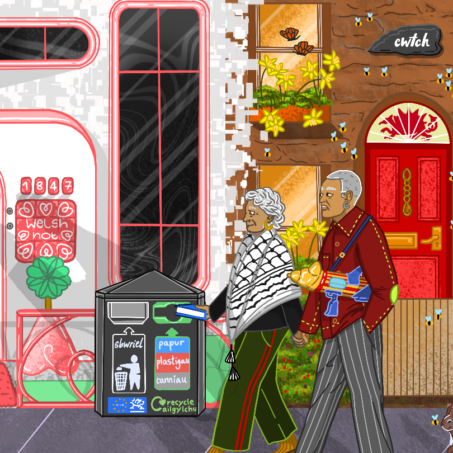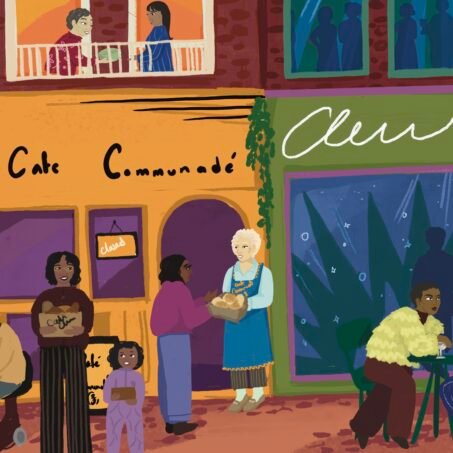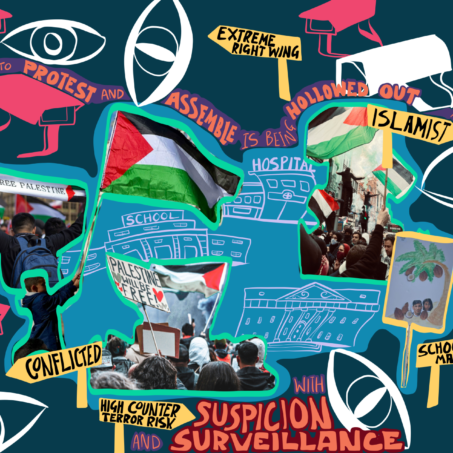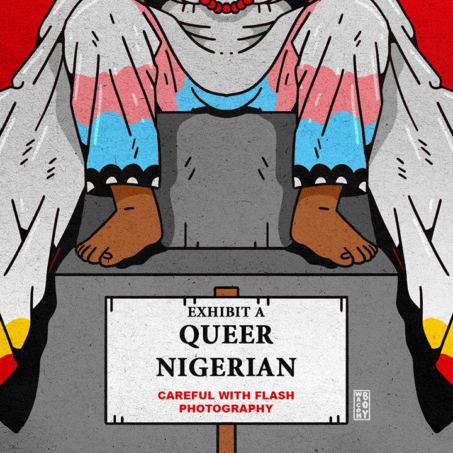“I came to the UK in 2014. That’s when I was like, I am definitely queer. And that’s when I realised I couldn’t sing about Jesus anymore.” These are the words of Zimbabwe-born EYVE, a singer-songwriter based in Glasgow. We’re chatting on Zoom about EYVE’s upcoming EP, Sista! Beyond the sky isn’t the limit.
Music has always been a part of EYVE’s life, thanks in large part to her church-going upbringing where she was a member of the gospel choir from a young age. And she acknowledges that this environment nurtured her in some ways. “It was my home for a long time,” she muses. “Lots of my friends were from there and it nurtured my confidence singing in front of others.” However, when it came to her queerness, her Christian faith, alongside social hostility – queer people are not legally protected from discrimination, harassment and abuse in Zimbabwe – meant she didn’t feel it was safe for her to come out.
Homophobia isn’t ours to keep!
For EYVE, and for many queer people, the possibility of homelessness and estrangement feels like part and parcel of coming out. In Zimbabwe, 64% of gay men and 27% of lesbian women have been disowned by their families. Prior to moving to Glasgow, EYVE was also kicked out by her family because she is queer. The statistics here in the UK are devastatingly similar. Stonewall research shows 1 in five LGBT+ people have experienced homelessness at some point in their lives and around half of LGBT+ people in the UK report being estranged from their families.
Homophobia, particularly how it presents in countries of the Global Majority, is engineered by histories of colonialism and imperialism. Across the world, the legacy of these histories have continued, resulting in the present day homophobia, discrimination and violence against queer people.
This turning point has been especially documented in Zimbabwe after its decolonisation in 1980, where homosexuality is viewed as ‘un-African’ and something brought over by the West. Homophobia leaves Queer Zimbabweans very vulnerable to violence, with many choosing to remain closeted, emigrate and in worst cases, die by suicide to escape this violence. Yet our histories of queerness are so different. Prior to colonisation, queerness has been well documented among the San people, the Khoikhoi people, the Ndebele people and the Shona people across Zimbabwe and southern Africa. Homophobia is a testament to white supremacies’ violent structuring of sexual and gender expression. We are forced to conform because we are punished with our lives if not.
There is no cost greater than making yourself palatable to those who can never see or receive you, and yet for many queer people across the globe, it’s a request made of us all the time. The request to shrink, conform and bury huge parts of ourselves.
Ballroom, so much more than a Ball or a Room
When we consider all of this, we understand why ‘chosen family’ is so vital for queer people. Many are estranged, homeless, isolated and lonely. Our need for a chosen family is to be seen, supported and nurtured in our sense of belonging. For EYVE, this was found in Glasgow’s Ballroom scene – a small but mighty community with a cult following in the city. Building since the late 2010s, prolific balls like House Ball and Q’IWA have attracted queer people from across Scotland to the city, as well as national and international talent including the likes of Jay Jay Revlon, to collaborate on these homegrown Glasgow balls.
EYVE remembers freshly being out in Glasgow in 2014, and essentially having to learn about the LGBT+ community, relationship dynamics and other people’s expression(s) of queerness essentially from scratch. EYVE described her first time stepping into a House Ball as “electric.” She remembers “the chants from the commentator swirling around the room, the stage lights piercing through the smoke machines and the people – my God, the people. Who stood and moved with the fiercest expression of themselves. It was liberating.” This was something EYVE had never seen or felt before, but she knew it was where she belonged. ‘I remember stepping in there and immediately leaving my feelings of shame and discomfort at the door,” she says. “Nobody in that room knew what that space had done for me that night.”
For EYVE, standing up for and empowering Black women is a personal ethos and politic. That’s the reason behind the name of her second EP, Sista! Beyond the sky isn’t the limit. It’s inspired by both Black sisterhood and one of EYVE’s favourite shows, The L Word. This EP is about queerness, specifically being a Black queer woman, and the reasons to celebrate ourselves despite living in a world so desperate to dim our light. She says: “In The L Word, you see Black women call themselves sister. It also happens in church; people say sister to each other, even if we’re not really related.” While EYVE is no longer in the church, ‘sister’ is a testament to our past transforming with us. No longer a passive pass-by comment to those in the congregation, who only accepted EYVE in her crumbs, sister has taken on a new cape – a call to go where love is. As EYVE comes into her queerness more, ‘sister’ is intentional. It’s the active building of kinship; reserved for those committed to loving her for who she is.
For EYVE and myself, there is something so affirming about hearing “sister” from another Black woman or femme. It’s a very clear moment of being seen entirely, without the feeling of being stripped or gawked at. It’s very clear camaraderie, protection and solidarity shown amongst a demographic of women who only have themselves and each other.
Discussing the album further, she states: “This new EP is about shedding the negative energy and thoughts that I hold on to about myself. It’s embracing and knowing that I’m not going to be okay, all the time.. And that’s okay.” This message is further reflected in the genres that EYVE explores. While in her previous release she used hip-hop and trap to explore ideas around boldness, in this EP EYVE is being more open and vulnerable. She does this by showing more parts of herself, her Zimbabwean heritage, her queerness. She says “This EP is more me, it’s more of my African roots, I’m singing more in Shona. I’m mixing like reggae and hip hop as well. And it sounds good.”
EYVE feels like she’s able to bear herself to the world in more vulnerable ways because she’s becoming more understanding of herself. She knows the person she once was had the tools to bring her up to this point and she deserves grace and forgiveness of the mistakes she made along the way. For this new chapter, EYVE is herself but different. The difference is EYVE believing she is worth the risk.
To be young, queer, gifted and Black
EYVE has grown to reject the idea of shrinking herself. It doesn’t serve her and it’s never served us. She believes that “expressing ourselves, our deepest desires, our stories, our existence(s) is the way we set ourselves and each other free.”
EYVE has personal experience with this through her music. She says: “one thing that sets me free is being honest with myself and sharing my experiences in my music.” She tells me about a show where she performed her song ‘Who are you to judge me’ for the first time. She remembers “there were other Zimbabwean women at that show who came up to me and they were like, That’s my story.” In that moment, she says, “it felt so good to know that someone can relate and, just knowing that it’s not the end of life when you go through things, you still get to do the things that you want to do.”
At that moment, we spoke about our Black, queer, feminist elder Audre Lorde. In Poetry is not a luxury, she writes: “the white father has told us I think therefore I am. And the black mother in each of us says I feel therefore I can be free.”
It’s a quote EYVE and I treasure deeply because there is no logic or action without heart. To feel something is to do something. EYVE remarked “Before therapy, I didn’t listen to my intuition and everytime I didn’t, I disappointed myself”. This world has taught us, especially as women, and especially as Black women, to neglect our emotional, spiritual and mental worlds. We are told these ‘feelings’ and ‘hunches’ hold no real weight in a world that requires your proof and workings. We hold our intuition in the pits of our guts never to be expressed, but only to be felt like raging seas inside of us. When we don’t honour our intuition, we are creating cycles of self doubt and distrust. Ultimately, we are dishonouring ourselves.
When we take ourselves up on the offer to bear ourselves to the world, even at the risk of being bruised and misunderstood, we offer that same opportunity to others. We do this knowing, when it’s all said and done, people can engage with us wholly and truthfully. We do this knowing that sharing this is an invitation into our worlds, for those who are willing to handle us with care and grace. Finally, like Audre Lorde and other Black elders before us, we do this knowing that our truth will too be seen by those who needed it most.
Our heartfelt conversation was coming to a close, but I couldn’t end it without asking EYVE what she hopes others feel when they listen to Um Indecisive! and the rest of the EP. She excitedly replies “I hope people feel love for themselves. I hope they feel like dancing! I want Black women to listen to it and to feel that they are enough and that it’s okay to talk about things, to lean on our communities and to be vulnerable. It’s not a weakness, it has always been our strength.”
What can you do?
Here’s what EYVE recommends you do to get back to feeling yourself, and find your way back home to yourself:
- Stream Um, Indecisive, Gotta Go (To Therapy), Download the whole EP Sista! Beyond the sky isn’t the limit out on March 20th – share it with your friends, family, and someone who’s in need of something feel good and heartfelt.
- Go for walks in nature, re-centre yourself in the beauty and healing properties nature has to offer.
- Dance in the mirror, there aren’t many things in life that can’t be solved by dancing in front of a mirror.
- Treat yourself like the precious egg you are! Go to your GP appointment, go to therapy, cook that nice meal you’ve always wanted, go and see that artist you’ve always wanted to see, do things that tend to you physically, emotionally, mentally and spiritually.
- We are the sum of people who have, who currently and who will love us. Lean in on your community, they are there for you and they love you. Make sure to give that same love and care in return, we’re all we’ve got!



